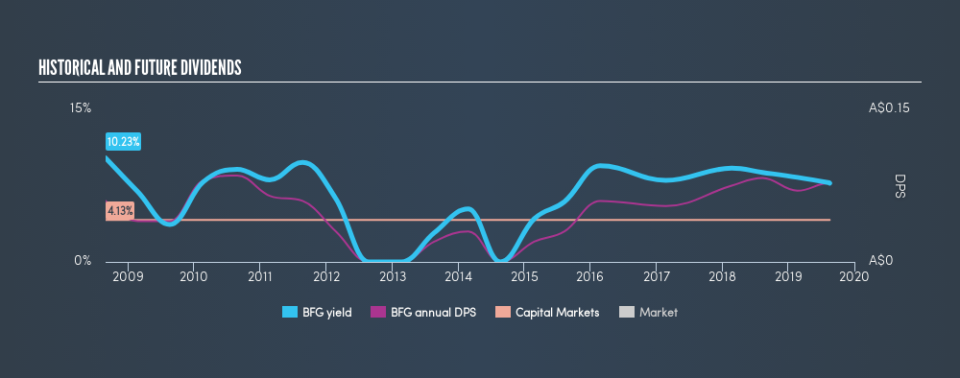Bell Financial Group Limited (ASX:BFG) Looks Like A Good Stock, And It's Going Ex-Dividend Soon

Some investors rely on dividends for growing their wealth, and if you're one of those dividend sleuths, you might be intrigued to know that Bell Financial Group Limited (ASX:BFG) is about to go ex-dividend in just 3 days. If you purchase the stock on or after the 21st of August, you won't be eligible to receive this dividend, when it is paid on the 29th of August.
Bell Financial Group's next dividend payment will be AU$0.035 per share. Last year, in total, the company distributed AU$0.077 to shareholders. Last year's total dividend payments show that Bell Financial Group has a trailing yield of 7.8% on the current share price of A$1. Dividends are an important source of income to many shareholders, but the health of the business is crucial to maintaining those dividends. That's why we should always check whether the dividend payments appear sustainable, and if the company is growing.
View our latest analysis for Bell Financial Group
If a company pays out more in dividends than it earned, then the dividend might become unsustainable - hardly an ideal situation. Bell Financial Group is paying out an acceptable 72% of its profit, a common payout level among most companies.
When a company paid out less in dividends than it earned in profit, this generally suggests its dividend is affordable. The lower the % of its profit that it pays out, the greater the margin of safety for the dividend if the business enters a downturn.
Click here to see how much of its profit Bell Financial Group paid out over the last 12 months.
Have Earnings And Dividends Been Growing?
Companies with consistently growing earnings per share generally make the best dividend stocks, as they usually find it easier to grow dividends per share. If earnings decline and the company is forced to cut its dividend, investors could watch the value of their investment go up in smoke. That's why it's comforting to see Bell Financial Group's earnings have been skyrocketing, up 30% per annum for the past five years.
Bell Financial Group also issued more than 5% of its market cap in new stock during the past year, which we feel is likely to hurt its dividend prospects in the long run. It's hard to grow dividends per share when a company keeps creating new shares.
The main way most investors will assess a company's dividend prospects is by checking the historical rate of dividend growth. In the last 10 years, Bell Financial Group has lifted its dividend by approximately 2.6% a year on average. It's good to see both earnings and the dividend have improved - although the former has been rising much quicker than the latter, possibly due to the company reinvesting more of its profits in growth.
Final Takeaway
From a dividend perspective, should investors buy or avoid Bell Financial Group? Bell Financial Group has an acceptable payout ratio and its earnings per share have been improving at a decent rate. Bell Financial Group ticks a lot of boxes for us from a dividend perspective, and we think these characteristics should mark the company as deserving of further attention.
Want to learn more about Bell Financial Group's dividend performance? Check out this visualisation of its historical revenue and earnings growth.
A common investment mistake is buying the first interesting stock you see. Here you can find a list of promising dividend stocks with a greater than 2% yield and an upcoming dividend.
We aim to bring you long-term focused research analysis driven by fundamental data. Note that our analysis may not factor in the latest price-sensitive company announcements or qualitative material.
If you spot an error that warrants correction, please contact the editor at editorial-team@simplywallst.com. This article by Simply Wall St is general in nature. It does not constitute a recommendation to buy or sell any stock, and does not take account of your objectives, or your financial situation. Simply Wall St has no position in the stocks mentioned. Thank you for reading.


